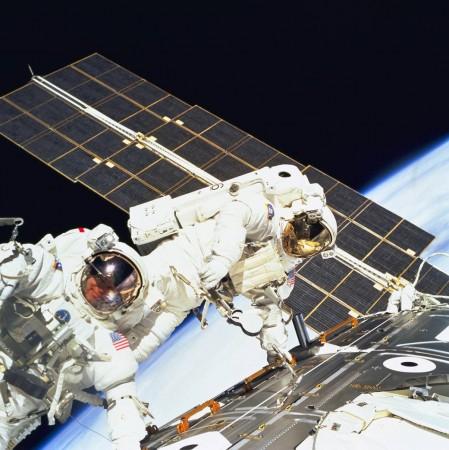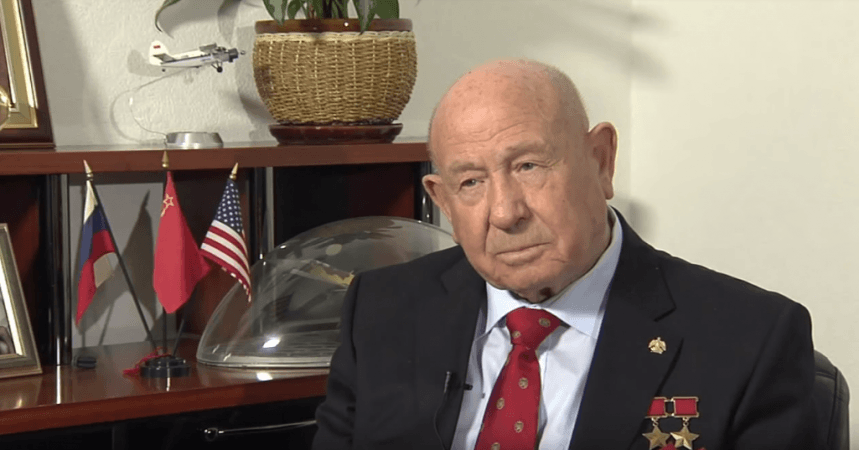
Fifty-three years ago, today, the first man had stepped outside a thin metal shell of the spacecraft – Voskhod-2 – to float in space. His name was Alexey Leonov and as it turns out, those 12 minutes and nine seconds of exploration was nearly a disaster.
The spacecraft had carried cosmonauts Leonov and Pavel Belyayev into an orbit for a rather simple mission: to make Earth's first spacewalk.
The time read exactly 11:32:54 when Belyayev had opened the outer airlock to expose Leonov to space. It took Leonov two minutes and he was floating free outside the Voskhod-2 spacecraft on a 5.35-meter tether.
It was a total of 12 minutes between the hatches opening and closing again, as Gizmodo reported.
Within the time he spent floating, he was supposed to carry out a simple mission that involved attaching a camera to the airlock, document the spacewalk with another camera attached to his chest and evidently, survive.
The first and last tasks were accomplished, but the middle one proved to be impossible for the cosmonaut. This was caused by his spacesuit that inflated too much due to the chest-mounted camera, which made it impossible for him to reach the camera's shutter switch placed on his thigh.
The entire incident was not only a dangerous affair, but almost a disaster too – purely because nobody knew what to expect.

As per medical reports, Leonov's core body temperature increased a whole 1.8°C within 20 minutes – meaning, he was dangerously close to a heatstroke. In his interviews, he shared how he pretty much sloshed in sweat within his spacesuit.
In a BBC report, he said: "My suit was becoming deformed. My hands had slipped out of the gloves [and] my feet came out of the boots. The suit felt loose around my body. I had to do something. I couldn't pull myself back using the cord. And what's more, with this misshapen suit, it would be impossible to fit through the airlock."
In its March 26, 1965 cover story, TIME had described the event as: "As air escaped from the [spacecraft's air lock], the vacuum of space reached into it like a monster's claw. Though it must have been rehearsed on earth over and over again, this was surely a moment of hideous crisis."
A valve releasing oxygen depressurized his suit enough to fit in through the valve. But the nitrogen content in his bloodstream caused him to suffer from an intense feeling of pins and needles all over.
Even after he was safely inside the spacecraft with Belyayev, the problems didn't stop. The inflatable airlock's ejection caused the spacecraft to spin, and another malfunction had sent oxygen levels climbing.
In an interview with RT, now-retired cosmonaut Leonov shared: "I keep going over the mission and I keep finding mistakes that could have been avoided. They could have led to tragedy, everything was on the edge.
"We were thrown to an altitude of 495 kilometers by an error, it [was]...200 kilometers higher than planned. And it so happened that we were flying some 5 kilometers below the radiation layer."
But what had impressed him the most – as expected – is the sheer tiny size of our planet as compared to the vast emptiness of space. In the same interview with RT, he says: "The sheer size of the Earth, space. We don't understand it on the ground. Only there you can comprehend space.
"While from inside the spacecraft cosmonauts could see only a small fraction of the scenery, outside the stars and the sun is everywhere... I did not expect all this. The silence struck me. I could hear my heart beating so clearly. I could hear my breath – it even hurt to think. The heavy breaths were looped via microphones and broadcast to Earth."
That very sound of Leonov's breathing was recorded and later infused into the soundtrack of the film 2001: A Space Odyssey.
The now 83-year-old was interviewed by NASA's Public Affairs Officer Rob Navias in Moscow back in May 2014. Watch the highlights of his historic spacewalk here:










